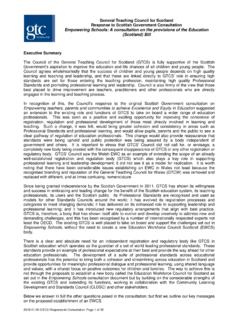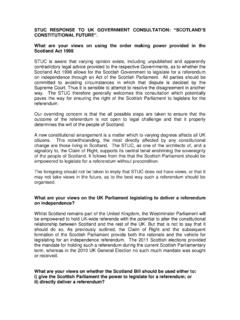Transcription of INTRODUCTION LICENSING HOUSES IN MULTIPLE …
1 INTRODUCTION : LICENSING HOUSES IN MULTIPLE OCCUPATION February 2018 A consultation to gather views on the LICENSING of HOUSES in MULTIPLE Occupation (HMOs) in Glasgow to inform the development of a future policy on overprovision and to consider the relationship between LICENSING and planning policy for HMOs. Housing (Scotland) Act 2006 consultation on future policy development for the LICENSING of HOUSES in MULTIPLE Occupation 1 INTRODUCTION : LICENSING OF HOUSES IN MULTIPLE OCCUPATION Statutory Duty In June 2000, a mandatory LICENSING scheme was introduced for HOUSES in MULTIPLE Occupation (commonly referred to as HMOs). The LICENSING scheme was introduced in order to improve safety standards for this type of rented living accommodation and to ensure that landlords, and their agents, are fit and proper persons to hold a licence.
2 Glasgow City Council is responsible for the LICENSING and regulation of HMOs in Glasgow. The Housing (Scotland) Act 2006 sets out the LICENSING scheme for living accommodation used as HMOs and provides the Council with a range of statutory powers in relation to dealing with licensed and unlicensed HMOs. The responsibility for determining HMO licencing policy and applications is delegated to the Council s LICENSING and Regulatory Committee. Further information on the Committee, including its membership and terms of reference, is available online: There are currently 3754 HMO licences issued in Glasgow. A summary and analysis of HMO licences in Glasgow is provided in Appendix A. What is a HMO? A HMO licence under the Housing (Scotland) Act 2006 is required for living accommodation where:- It is occupied by three or more unrelated persons from three or more different families; It is occupied by them as their only or main residence; and It is either a house, premises or group of premises owned by the same person and provides shared sanitary and cooking facilities.
3 The living accommodation can comprise a house, a flat, purpose built student accommodation, a hostel and any other type of accommodation which falls within the definition of a HMO under the 2006 Act, unless there is a specific exemption for that type of accommodation, for example accommodation for the armed forces, prisons and other similar institutions. Only the owner of the living accommodation can apply for a HMO licence, which can include a private individual, a registered social landlord or a corporate body. It is a criminal offence to operate living accommodation as a HMO without the required licence. 2 INTRODUCTION : LICENSING OF HOUSES IN MULTIPLE OCCUPATION What is the purpose of LICENSING HMOs? The main purpose of LICENSING HMOs is to ensure that:- (i) the applicant for the licence and any agent responsible for the day to day management of the living accommodation is a fit and proper person to hold a licence; and (ii) the living accommodation is suitable for use as a HMO.
4 In determining the suitability of the living accommodation, regard must be given to:- the location of the accommodation; the condition of the accommodation; any amenities the accommodation contains; the type and number of persons likely to occupy the accommodation; whether any rooms have been sub-divided; whether any rooms have been adapted resulting in an alteration of the situation of the water and drainage pipes within the accommodation; the safety and security of persons likely to occupy the accommodation; and the possibility of undue public nuisance. The LICENSING process for HMOs allows for an inspection of the living accommodation to be carried out in order to ensure that it meets, or continues to meet, the required standards. Further information on the standards to be met to obtain a HMO licence are set out in the Scottish Government s statutory guidance for local authorities.
5 A copy of the guidance can be found at:- In considering the suitability of the living accommodation in terms of the condition of the accommodation and the safety and security of those people likely to occupy it, regard should also be given to the level of fire safety within the accommodation and the applicant s compliance with the requirements of the Fire (Scotland) Act 2005. Scottish Fire and Rescue are a statutory consultee on all HMO licence applications. Regulation of HMOs Where a HMO licence is granted, the licence holder will be subject to a number of conditions under the licence in relation to the health, safety and welfare of the tenants living in the premises. These conditions include: Controlling the number of tenants who can occupy the living accommodation; Requiring that the living accommodation is maintained to the Council s standards for HMOs; 3 INTRODUCTION : LICENSING OF HOUSES IN MULTIPLE OCCUPATION Ensuring that the living accommodation, including the structure, furniture and fittings are properly maintained and any deficiencies rectified; Requiring that all electrical and gas installations in the living accommodation are properly maintained and serviced, with certification capable of being produced to Council officers on request; Ensuring that the means of escape from the living accommodation are capable of being safely and effectively used at all times.
6 Requiring that the licence holder is able to produce the Tenants Information Pack, Tenancy Management Agreement and Buildings Insurance to Council officers on request; Requiring that the licence holder acts reasonably in relation to the management of the living accommodation and in all dealings with the tenants; Requiring participation in any communal repairs and maintenance; Requiring the licence holder to take all reasonable steps to prevent and deal with any antisocial behaviour, noise or other nuisance occurring within the living accommodation or common parts of the property as a result of the actions or omissions of the tenants or their visitors; Requiring the licence holder to provide and maintain adequate facilities for the storage and disposal of refuse at the rear of the living accommodation and to take all reasonable steps to ensure that refuse facilities are properly used at all times by tenants and that refuse is disposed of appropriately.
7 Enforcement Powers for HMOs The Housing (Scotland) Act 2006 provides a range of enforcement powers to tackle and address poorly managed licensed HMOs. Enforcement activity is led by the HMO Unit based within the Council s Housing Intervention and Support Team in Development and Regeneration Services. Officers from the HMO Unit carry out investigations in response to complaints and concerns raised regarding the management or operation of licensed HMOs. While most complaints are capable of being resolved informally following an approach to the licence holder or agent of the HMO, a range of statutory powers are available in the event that informal intervention does not resolve the matter. Where there has been a breach of a licence condition, officers from the HMO Unit can serve a notice on the licence holder outlining the remedial action requiring to be taken and the timescale for doing so.
8 Failure to comply with such a notice is a criminal offence. 4 INTRODUCTION : LICENSING OF HOUSES IN MULTIPLE OCCUPATION Where defects in the living accommodation have been identified, officers from the HMO Unit can serve an Amenity Notice on the licence holder requiring that work is undertaken to make it fit for occupation. If the licence holder fails to comply with the Amenity Notice, the Council may carry out the works in default and recover the monies through the recording of a re-payment charge. Officers from the HMO Unit are also authorised under the Housing (Scotland) Act 2006 to enter licensed HMOs for the purposes of carrying out a survey and examination of the living accommodation in order to determine whether a licence condition has been breached and to ensure that standards within the living accommodation are being maintained.
9 Where the living accommodation is found to be no longer suitable for occupation as a HMO, or the licence holder has breached one or more of the licence conditions, a report may be submitted to the LICENSING and Regulatory Committee which could lead to the revocation of the HMO licence. In addition to the enforcement powers used in relation to licensed HMOs, officers from the HMO Unit also proactively identify suspected unlicensed HMOs, using a range of resources and records from other parts of the Council including Private Landlord Registration and Council Tax. Where unlicensed HMOs have been identified, this has led to the submission of HMO licence applications to provide for the proper regulation of the living accommodation. Powers are also available to report unlicensed landlords to the Procurator Fiscal and/or to serve Suspension of Rent Orders.
10 5 SEEKING YOUR VIEWS Seeking Your Views The LICENSING and Regulatory Committee is keen to ensure that future HMO policy is aligned to the needs of our local communities providing safe and suitable living accommodation to tenants whilst ensuring that the operation of such accommodation does not negatively impact local residents. The LICENSING and Regulatory Committee has instructed that a consultation and evidence gathering process is undertaken to seek views on the LICENSING and regulation of HMOs. In particular, the Committee is seeking views on whether: a policy on the overprovision of HMOs should be developed; and whether a link should be made between LICENSING policy and planning policy for HMOs. This consultation is an important first stage in the development of any future policy and is essential for establishing the evidential basis of any policy, particularly on the key issue of overprovision of HMOs.







